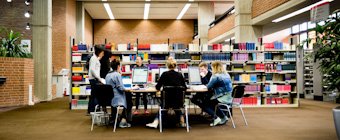DIES Conference

"Achieving the Millennium Development Goals: A Challenge for Global Higher Education"
Berlin, 3-4 November 2004
At the Berlin Conference HRK, DAAD and GTZ formulated their joint goals in higher education development cooperation. More than 300 university leaders and staff as well as national and international experts from science, politics and business accepted the invitation to the conference that was held on the historic premises of the Berlin-Brandenburg Academy of Sciences.
The commitment of higher education institutions to development cooperation creates mutual benefit: While universities employ the professional input and the practice-oriented know-how of local projects, they in turn supplement this local know-how with up-to-date scientific findings. Numerous successful cooperative links and networks in the higher education sector already make valuable contributions to development cooperation.
Within the framework of the conference on 3/4 November 2004 in Berlin the organising institutions agreed to further strengthen the role of higher education institutions in development cooperation in the future. Dr Christiane Ebel-Gabriel, Secretary-General of HRK, underlined the relevance of close collaboration between higher education institutions and development cooperation, emphasizing that there was a genuine interest in collaboration and that it enhanced the universities’ institutional profile. Dr Bernd Eisenblätter, Managing Director of GTZ, affirmed that higher education institutions were seismographs of developments and trends in partner countries. Universities carried know-how that was essential for the success of GTZ projects. Professor Theodor Berchem, President of DAAD, emphasized that development cooperation was not a one-sided endeavour, but created a win-win situation for those involved. All conference participants agreed in that both, the North and the South needed competitive higher education institutions within an effective and efficient tertiary system. This was a critical starting point for poverty reduction and sustainable development as well as for the achievement of the United Nation's Millennium Development Goals.
Conference Programme
Welcoming Addresses:
Dr Christiane Ebel-Gabriel, General Secretary, HRK
Professor Dr Theodor Berchem, President, DAAD
Dr Bernd Eisenblätter, Managing Director, GTZ
Erich Stather, State Sekretary, Federal Ministry for Economic Cooperation and Development
Session I
How Can Higher Education Contribute Effectively to Achieving the Millennium Development Goals?
Dr Kilemi Mwiria, Assistant Minister for Higher Education, Kenya
Input Statement, Presentation
Dr Maureen Lewis, Senior Fellow, Center for Global Development, Washington DC, USA
Session II
From Aid to Global Sharing of Knowledge: Research Excellence and Commitment to Development
Dr William Saint, Lead Education Specialist, Africa Region, The World Bank
Professor Bungaran Saragih, Minister of Agriculture, Indonesia, and Project Partner of Göttingen University
Session III
The Contribution of Higher Education Institutions to Poverty Reduction: Best Practice Examples
Workshop 1: Health
Professor M.T. Leshabari, Dean, School of Public Health and Social Sciences, MUCHS, University of Dar es Salaam
Dr. Sigrid Wolter, Head, Master of Science in Community Health and Health Management in Developing Countries, Institute of Tropical Hygiene and Public Health, University of Heidelberg
Presentation
Dr. Michael Marx, Managing Director, evaplan GmbH at University of Heidelberg
Professor Dr. Rainer Sauerborn, Director, Institute of Tropical Hygiene and Public Health, University of Heidelberg
Workshop 2: Environment
Professor Dr.-Ing. Jackson Roehrig, Deputy Dean, Institute for Technology in the Tropics, University of Applied Sciences Cologne, Germany
Presentation, Results
Workshop 3: Capacity Building in Education
National Pedagogical University (UPNFM), Honduras
Dr Parto Teherani-Krönner, Head of Gender Studies in Rural Areas at the Faculty of Agriculture and Horticulture, Humboldt University of Berlin
Professor Balghis Y. Badri, Director, Institute for Women, Gender and Development Studies, Afhad University for Women, Omduram, Sudan
Presentation
Workshop 4: Global Partnership
Professor Timothy N. Ngwira, University of Malawi
Professor Clemens B.A. Wollny, Georg-August University of Göttingen
Report
UNICAMBIO XXI: German-Latin-American Co-operation Facing the Challenge of Higher Education in the New Century
Dr Ana Maria Pechen de D'Angelo, Rector, National University of Comahue, Argentina
Abstract, Presentation
Towards a Regional Quality Assurance Regime: The Case of the Higher Education Quality Management Initiative for Southern Africa (HQMISA)
Professor Amos P.N. Thapisa, Director, Centre for Academic Development, University of Botswana, Gaborone, Botswana
Abstract, Presentation
Global Partnership or Global Challenges: Higher Education in Vietnam in Transition
Dr Pham Quang Minh, Deputy Dean, Department of International Studies, Unviersity of Social Sciences and Humanities, Vietnam National University, Hanoi, Vietnam
Abstract, Presentation
Dr. Regine Schoenenberg, Political Scientist, "Between Lecture Hall and Project", Berlin, Germany
